实验5
实验任务1
task1_1.c
#include<stdio.h> #include<stdlib.h> #define N 4 int main() { int x[N] = {1, 9, 8, 4}; int i; int *p; //方式1:通过数组名和下标遍历输出数组元素 for(i = 0; i<N; ++i) printf("%d", x[i]); printf("\n"); //方式2:通过指针变量遍历输出数组元素(写法1) for(p = x;p< x + N; ++p) printf("%d", *p); printf("\n"); //方式2:通过指针变量遍历输出数组元素(写法2) p = x; for(i = 0;i < N;++i) printf("%d", *(p + i)); printf("\n"); //方式2:通过指针变量遍历输出数组元素(写法3) p = x; for(i = 0; i < N; ++i) printf("%d", p[i]); printf("\n"); system("pause"); return 0; }
运行截图

task1-2.c
#include<stdio.h> #include<stdlib.h> int main() { int x[2][4] = {{1, 9, 8, 4},{2, 0, 4, 9}}; int i, j; int *p;//指针变量,存放int类型数据的地址 int(*q)[4];//指针变量,指向包含4个int型元素的一维数组 //使用数组名、下标访问二维数组元素 for(i = 0; i < 2; ++i) { for(j = 0; j <4; ++j) printf("%d",x[i][j]); printf("\n"); } //使用指针变量p间接访问二维数组元素 for(p=&x[0][0],i = 0;p<&x[0][0]+8;++p,++i) { printf("%d",*p); if((i+1)%4==0) printf("\n"); } //使用指针变量q间接访问二维数组元素 for(q = x; q < x+2;++q) { for(j = 0;j < 4;++j) printf("%d",*(*q + j)); printf("\n"); } system("pause"); return 0; }
运行截图

实验任务2
task2-1.c
#include<stdio.h> #include<string.h> #include<stdlib.h> #define N 80 int main() { char s1[] = "Learning makes me happy"; char s2[] = "Learning makes me sleepy"; char tmp[N]; printf("sizeof(s1)vs. strlen(s1):\n"); printf("sizeof(s1) = %d\n",sizeof(s1)); printf("strlen(s1) = %d\n",strlen(s1)); printf("\nbefore swap: \n"); printf("s1:%s\n",s1); printf("s2:%s\n",s2); printf("\nswapping...\n"); strcpy(tmp, s1); strcpy(s1, s2); strcpy(s2, tmp); printf("\nafter swap:\n"); printf("s1:%s\n",s1); printf("s2:%s\n",s2); system("pause"); return 0; }
运行截图

Q1:数组s1大小24,sizeof(s1)计算的是数组占用字节数,strlen(s1)统计的是除'\0'以外的字符数
Q2:不可以替换 s1为地址常量
Q3:交换了
task2-2.c
#include<stdio.h> #include<string.h> #include<stdlib.h> #define N 80 int main() { char *s1 ="Learning makes me happy"; char *s2 = "Learning makes me sleepy"; char *tmp; printf("sizeof(s1)vs. strlen(s1):\n"); printf("sizeof(s1) = %d\n",sizeof(s1)); printf("strlen(s1) = %d\n",strlen(s1)); printf("\nbefore swap: \n"); printf("s1:%s\n",s1); printf("s2:%s\n",s2); printf("\nswapping...\n"); tmp = s1; s1 = s2; s2 = tmp; printf("\nafter swap:\n"); printf("s1:%s\n",s1); printf("s2:%s\n",s2); system("pause"); return 0; }
运行截图
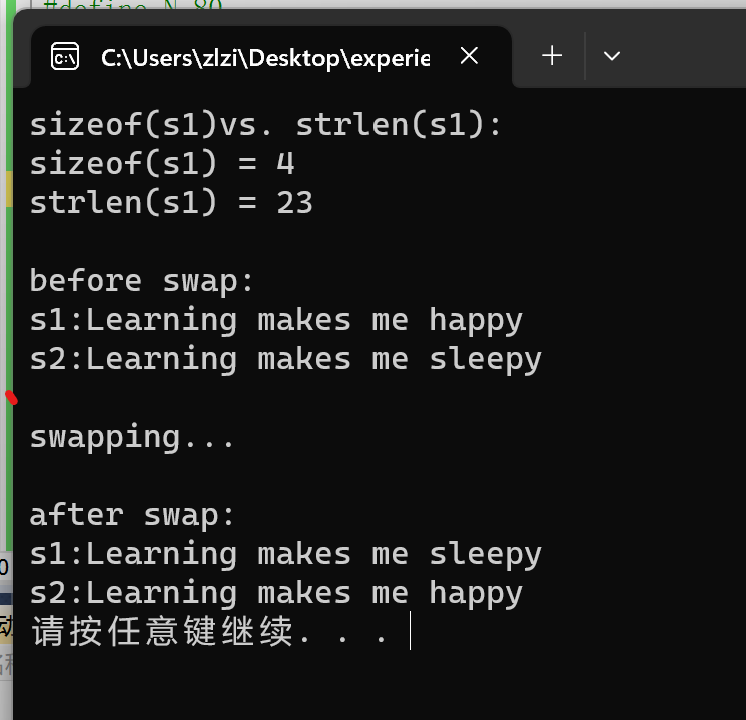
Q1:存放的是字符串的地址,sizeof(s1)计算的是地址所占字节数,strlen(s1)是整个字符串的有效字符数
Q2:可以,s1是指针变量,上一个task s1为地址常量
Q3:交换的是保存的地址,没有
实验任务3
task3.c
#include<stdio.h> #include<stdlib.h> void str_cpy(char * target, const char *source); void str_cat(char *str1, char *str2); int main() { char s1[80], s2[20] = "1984"; str_cpy(s1, s2); puts(s1); str_cat(s1, "Animal Farm"); puts(s1); system("pause"); return 0; } void str_cpy(char * target, const char *source) { while(*target++ = * source++) ; } void str_cat(char *str1, char *str2) { while(*str1) str1++; while(*str1++ = *str2++) ; }
运行截图

实验任务4
#include<stdio.h> #include<stdlib.h> #define N 80 int func(char *); int main() { char str[80]; while(gets(str)!= NULL) { if(func(str)) printf("yes\n"); else printf("nope\n"); } system("pause"); return 0; } int func(char *str) { char *begin, *end; begin = end = str; while(*end) end++; end--; while(begin<end) { if(*begin != *end) return 0; else { begin++; end--; } } return 1; }
运行截图
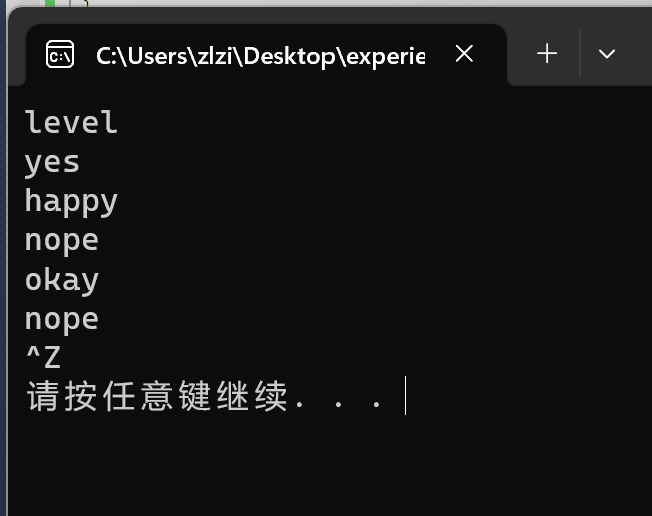
实验任务5
#include<stdio.h> #include<stdlib.h> #define N 80 void func(char *); int main() { char s[N]; while(scanf("%s", s)!=EOF) { func(s); puts(s); } system("pause"); return 0; } void func(char *str) { int i; char *p1, *p2, *p; p1 = str; while(*p1=='*') p1++; p2 = str; while(*p2)//!! p2++; p2--; while(*p2 == '*' ) p2--; p = str; i = 0; while(p < p1) { str[i] = *p; p++; i++; } while(p <=p2) { if(*p !='*') { str[i] = *p; i++; } p++; } while(*p !='\0') { str[i] = *p; p++; i++; } str[i] = '\0'; }
运行截图
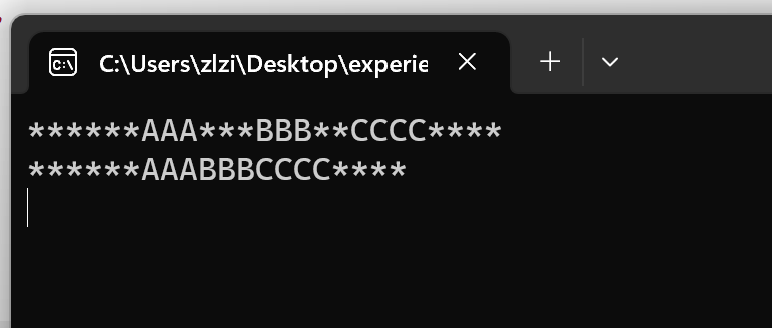
实验任务6
task6-1.c
#include<stdio.h> #include<stdlib.h> void sort(char *name[], int n); int main() { char *course[4] = {"C Program", "C++ object Oriented Program", "Operating System", "Data Structure and Algorithms"}; int i; sort(course, 4); for(i = 0; i< 4; i++) printf("%s\n",course[i]); system("pause"); return 0; } void sort(char *name[], int n) { int i, j; char *tmp; for(i = 0; i<n-1; ++i) for(j = 0;j < n-1-i;++j) if(strcmp(name[j],name[j+1])>0) { tmp = name[j]; name[j] = name[j+1]; name[j+1] = tmp; } }
运行截图

task6-2.c
#include<stdio.h> #include<stdlib.h> #include<string.h> void sort(char *name[],int n); int main() { char *course[4] = {"C Program", "C++ object Oriented Program", "Operating System", "Data Structure and Algorithms"}; int i; sort(course, 4); for(i = 0;i<4;i++) printf("%s\n",course[i]); system("pause"); return 0; } void sort(char *name[], int n) { int i, j, k; char *tmp; for(i = 0; i<n-1;i++) { k = i; for(j = i+1;j<n;j++) if(strcmp(name[j],name[k])<0) k = j; if(k!= i) { tmp = name[i]; name[i] = name[k]; name[k] = tmp; } } }
运行截图
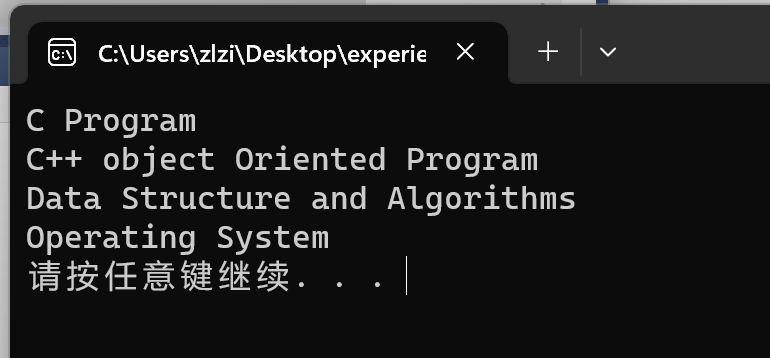
交换的是指针变量的值
实验任务7
task7.c
#include<stdio.h> #include<string.h> #include<stdlib.h> #define N 5 int check_id(char *str);//函数声明 int main() { char *pid[N] = {"31010120000721656X", "330106199609203301", "53010220051126571", "510104199211197977", "53010220051126133Y"}; int i; for(i = 0; i< N;++i) if(check_id(pid[i]))//函数调用 printf("%s\tTrue\n",pid[i]); else printf("%s\tFalse\n",pid[i]); system("pause"); return 0; } int check_id(char *str) { char *p; p = str; while((*p>='0'&&*p<='9')||*p=='X') p++; if(*p=='\0'&&strlen(str)==18) return 1; else return 0; }
运行截图
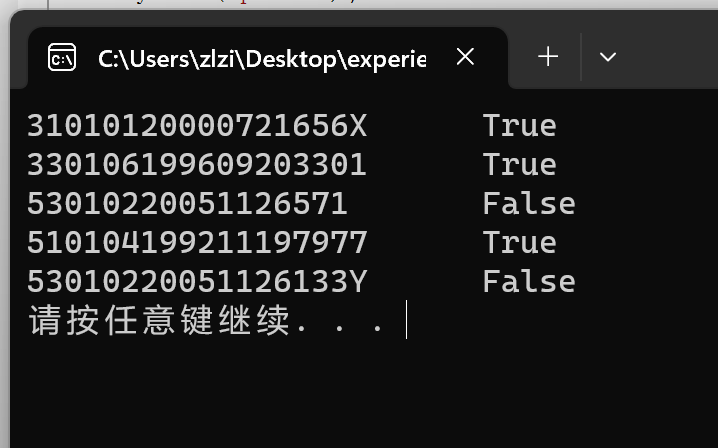
实验任务8
task 8.c
#include<stdio.h> #include<stdlib.h> #include<stdio.h> #define N 80 void encoder(char *s);//函数声明 void decoder(char *s);//函数声明 int main() { char words[N]; printf("输入英文文本:"); gets(words); printf("编码后的英文文本:"); encoder(words);//函数调用 printf("%s\n",words); printf("对编码后的英文文本解码:"); decoder(words);//函数调用 printf("%s\n",words); system("pause"); return 0; } void encoder(char *s) { while(*s!='\0') if(*s>=65 && *s<=90||*s>=97 && *s<=122) { *s = *s+1; *s++; continue;} else if(*s=='z'||*s=='Z') { *s = *s-25; *s++; continue;} else *s++; } void decoder(char *s) { while(*s!='\0') if(*s>=65&&*s<=90||*s>=97&&*s<=122) { *s = *s-1; *s++; continue; } else if(*s=='a'||*s=='A') { *s = *s+25; *s++; continue; } else s++; }
运行截图

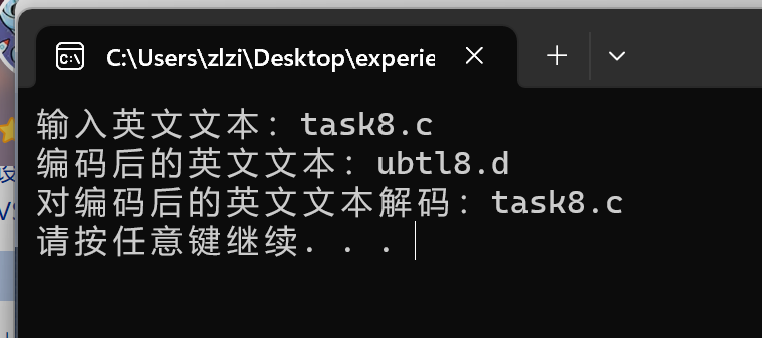

Bingo~


 浙公网安备 33010602011771号
浙公网安备 33010602011771号